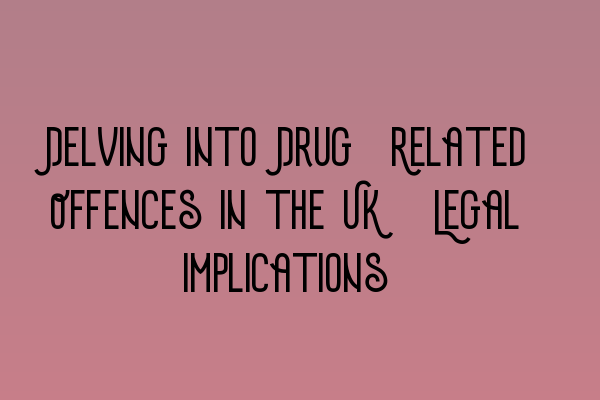Delving into Drug-Related Offences in the UK: Legal Implications
Welcome to SQE Criminal Law & Practice Law UK, where we provide expert guidance on a wide range of legal matters. Today, we will be delving into the complex world of drug-related offences in the United Kingdom and the legal implications that come with them.
Understanding Drug Laws in the UK
Drug-related offences in the UK are governed by various laws and regulations. The Misuse of Drugs Act 1971 is the primary legislation that outlines the classification, possession, supply, and production of drugs. It categorizes drugs into three classes: Class A, Class B, and Class C.
Class A drugs, such as heroin and cocaine, carry the highest penalties due to their high potential for harm. Possession, supply, or production of these drugs can result in severe consequences, including lengthy prison sentences.
Class B drugs, including cannabis and amphetamines, have lower potential for harm but are still considered illegal. Offences related to Class B drugs may lead to imprisonment and fines. On the other hand, Class C drugs, such as anabolic steroids and some tranquilizers, carry fewer penalties.
Common Drug-Related Offences
Drug-related offences encompass a wide range of activities, all of which have serious legal implications. It’s crucial to have a thorough understanding of these offences to ensure effective legal representation. Some common drug-related offences include:
- Drug possession
- Drug distribution
- Drug trafficking
- Drug manufacturing
- Conspiracy to supply drugs
Legal Consequences
The legal consequences for drug-related offences depend on various factors, including the type and quantity of drugs involved, the role of the individual in the offence, and their previous criminal record. Penalties can range from fines and community orders to imprisonment.
For instance, drug possession can lead to a maximum sentence of up to seven years in prison and an unlimited fine. Drug trafficking, on the other hand, can result in life imprisonment and heavy fines.
It’s important to note that drug-related offences can also have other consequences, such as reputational damage, employment difficulties, and restrictions on international travel.
Legal Defenses
If you find yourself facing drug-related charges, it’s essential to seek professional legal advice to explore possible defenses. Common defenses in drug-related cases include:
- Lack of knowledge or intent
- Unlawful search or seizure
- Misidentification of drugs
- Entrapment
- Coerced confession
Our team at SQE Criminal Law & Practice Law UK is well-versed in analyzing the circumstances surrounding drug-related offences and can provide expert advice tailored to your specific case.
Seek Professional Legal Assistance
Given the complexities and severe legal implications associated with drug-related offences, it is crucial to seek professional legal assistance. At SQE Criminal Law & Practice Law UK, we offer comprehensive SQE 1 and SQE 2 preparation courses to help aspiring solicitors navigate the intricacies of criminal law.
Before embarking on your legal journey, it is essential to familiarize yourself with the SRA SQE exam dates. Additionally, our SQE 1 Practice Exam Questions and SQE 1 Practice Mocks FLK1 FLK2 can provide valuable resources to enhance your preparation.
Reach out to our team at SQE Criminal Law & Practice Law UK today to take the first steps towards a successful legal career. Our experts are here to guide and support you in your journey.
Contact us today for more information on our SQE 1 and SQE 2 preparation courses and start your journey towards becoming a qualified solicitor.
SQE 1 Practice Mocks FLK1 FLK2
